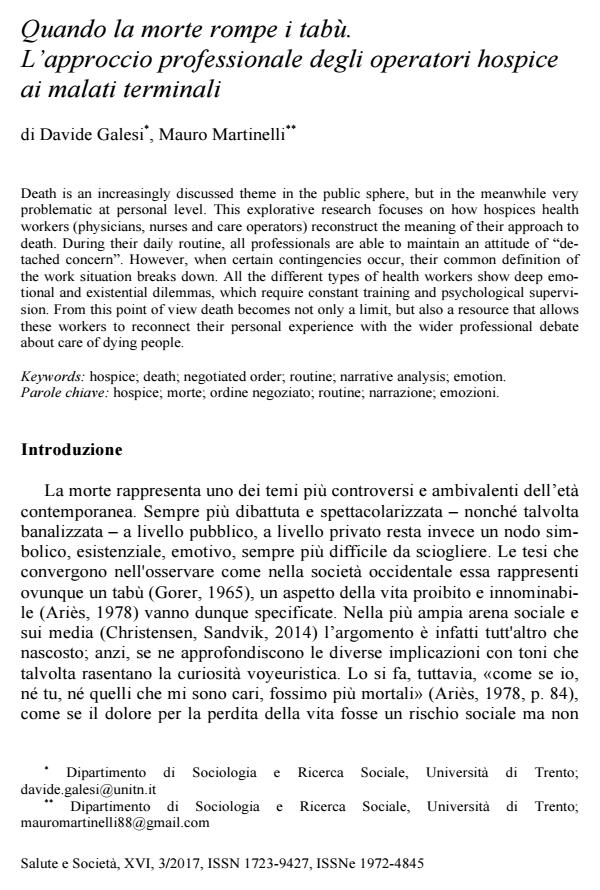Quando la morte rompe i tabù. L’approccio professionale degli operatori hospice ai malati terminali
Titolo Rivista SALUTE E SOCIETÀ
Autori/Curatori Davide Galesi, Mauro Martinelli
Anno di pubblicazione 2017 Fascicolo 2017/3
Lingua Italiano Numero pagine 14 P. 119-132 Dimensione file 80 KB
DOI 10.3280/SES2017-003010
Il DOI è il codice a barre della proprietà intellettuale: per saperne di più
clicca qui
Qui sotto puoi vedere in anteprima la prima pagina di questo articolo.
Se questo articolo ti interessa, lo puoi acquistare (e scaricare in formato pdf) seguendo le facili indicazioni per acquistare il download credit. Acquista Download Credits per scaricare questo Articolo in formato PDF

FrancoAngeli è membro della Publishers International Linking Association, Inc (PILA), associazione indipendente e non profit per facilitare (attraverso i servizi tecnologici implementati da CrossRef.org) l’accesso degli studiosi ai contenuti digitali nelle pubblicazioni professionali e scientifiche.
Death is an increasingly discussed theme in the public sphere, but in the meanwhile very problematic at personal level. This explorative research focuses on how hospices health workers (physicians, nurses and care operators) reconstruct the meaning of their approach to death. During their daily routine, all professionals are able to maintain an attitude of "detached concern". However, when certain contingencies occur, their common definition of the work situation breaks down. All the different types of health workers show deep emotional and existential dilemmas, which require constant training and psychological supervision. From this point of view death becomes not only a limit, but also a resource that allows these workers to reconnect their personal experience with the wider professional debate about care of dying people.
Parole chiave:Hospice; morte; ordine negoziato; routine; narrazione; emozioni.
- La dimensione spirituale nelle pratiche di cura del fine vita. Limiti da superare e modelli da implementare Barbara Sena, Enrico De Luca, in SALUTE E SOCIETÀ 1/2024 pp.83
DOI: 10.3280/SES2024-001006
Davide Galesi, Mauro Martinelli, Quando la morte rompe i tabù. L’approccio professionale degli operatori hospice ai malati terminali in "SALUTE E SOCIETÀ" 3/2017, pp 119-132, DOI: 10.3280/SES2017-003010